In this issue
Features
Learning about Biodynamics

Why is the cow so important in Biodynamics? Answer: because it is so calm and contented.
-Rafaele Joudry
Ten of us recently spent two days at Narara Ecovillage learning about Biodynamic compost and other wonders of Biodynamic gardening methods.
Biodynamics seeks to integrate scientific understanding with a recognition of spirit in nature. Biodynamics sees a garden or farm as a living organism made up of interdependent material and spirit elements, each of which needs to be nurtured to foster the health of the whole.
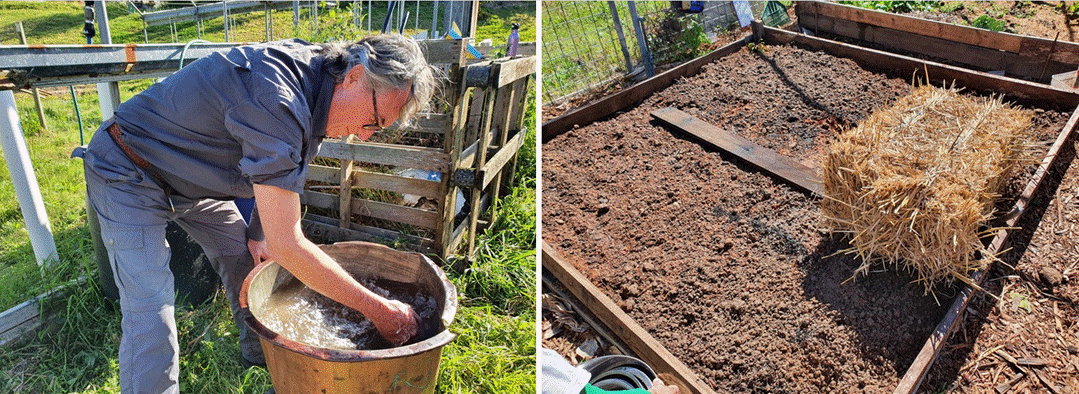
Some of us were there because, having eaten biodynamic food, we wanted to know the secret of how to grow it. Those who have eaten it agree that biodynamic food really is superior to regular organic food.
With many decades of experience to bring to us—it was something like her 120th compost pile!—teacher Diane Watkin was generous in sharing her depth of knowledge.
Although I grew up around Steiner ideas and have several family members quite involved in Steiner communities, there were some very new learnings for me.
For example: Why is the cow so important in Biodynamics? Answer: because it is so calm and contented. It brings this peaceful energy to the farm. Also, having four stomachs, it produces very well processed manure which is ideal for starting the Biodynamic formulae.
The Biodynamic calendar is an astounding document combining elements of astronomy, such as the moon’s distance from the earth, the position of the planets, and on which days it’s best to do nothing in the garden, and which days are best for planting greens, roots, flowers or fruit and seeds.
Some of the processes do seem mysterious and a little like magic. But when you hear them described by a knowledgeable practitioner, and as science advances, and we learn more about the incredible detail of the microscopic world and the complexity of holistic nutrition and ecosystems, it’s possible to conceive that they may all have a scientific explanation. Even if only half of them do, there is no doubt that biodynamic farming does work.
Of course we used the famous Preparation 500, the core of biodynamic preparations, which we mixed in a bucket for an hour with our bare arms — taking turns (it’s good to have a group of 10!) and then scattered reverently around the garden. We also applied emulsions of fish, seaweed, worm tea, weed tea, and other pre-made biodynamic preparations. It will be very interesting to see how healthy those plants turn out.
The top was mulched with straw, which I learned is an ideal mulch as it lets the water through, lets the sun through, lasts for several re-uses and adds silica to the soil. Here’s an article on why silica is important in the garden.https://hydrobuilder.com/learn/silica-for-plants/
We also made a biodynamic compost heap. What an extraordinary invention! Constructing the heap was like making a precisely designed French gateau with many important ingredients, combined in a precise manner following Diane’s expertise.
One participant had gathered at least 8 wheelie bins of green and brown matter. But we also added several other key ingredients, including four pre-prepared bio dynamic preparations which had taken months to make. These were inserted into balls of a previous biodynamic compost and used to inoculate the heap to initiate the replication of all the right microbes.
The centre of the heap was structured to ensure that it remains aerated throughout the process and doesn’t go sour.
This is a two-stage compost process which does not release greenhouse gases (as we do, unfortunately, when we turn our compost). Instead, those gases are reabsorbed during phase two, adding to the nutrient density of the finished product.
Also, intentionally included in the heap were …shock horror… plenty of blooming fireweed and onion weed with lots of corms!!! Our teacher assured us that these all break down in a properly managed biodynamic compost process.
The biodynamic compost is so rich that you only need to add a few handfuls to each garden bed. Biodynamic proponents call the formulae magic, as their use results in richer, deeper much more fertile soils.
I watched a fascinating talk the other day from an advocate of Steiner’s work, on the philosophy of science and how it is created and influenced by our socio-cultural system. Here it is if you’d like to spend a thought provoking hour or so.https://www.youtube.com/watch?v=nsH6-n7BUtw
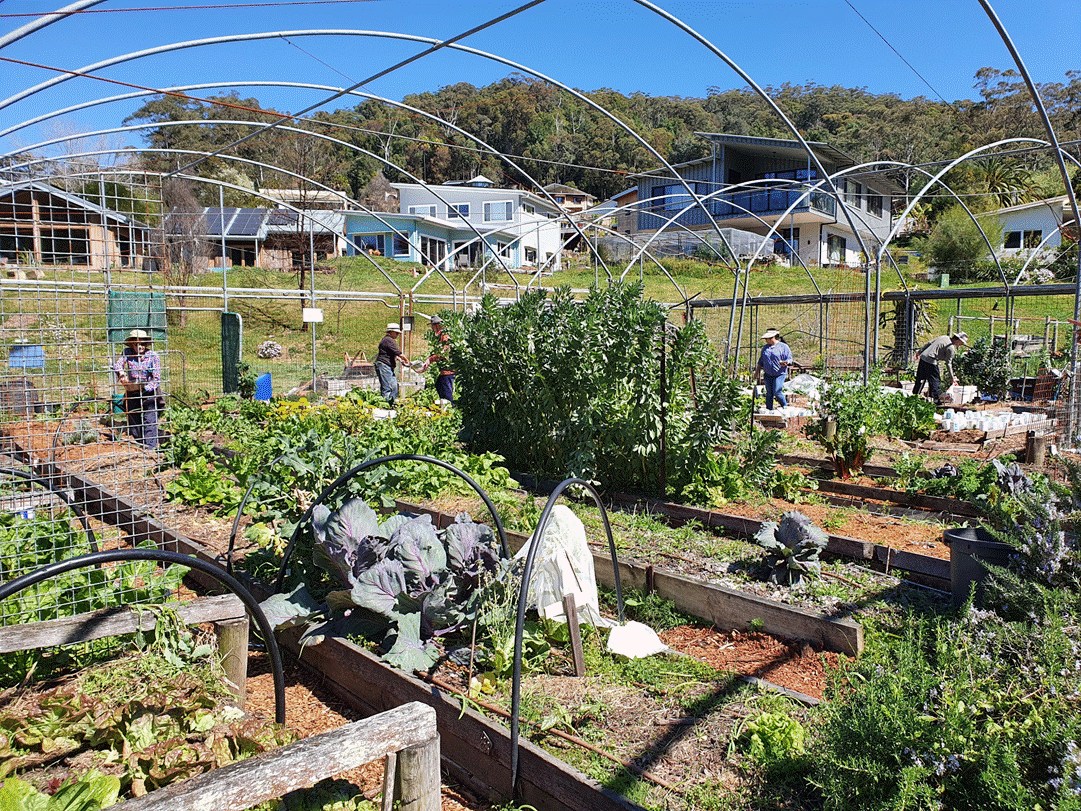
How to Make Soap
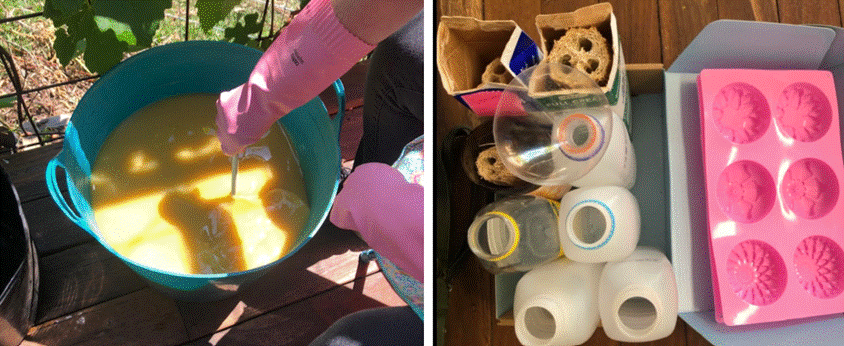
-Donna Carey
Have you ever thought about making your own soap? Donna shares what she learned at a recent soap-making workshop with one of her Permaculture gurus, Linda Woodrow. Among her numerous accolades, Linda wrote The Permaculture Home Garden, and more recently, her first novel: 470.
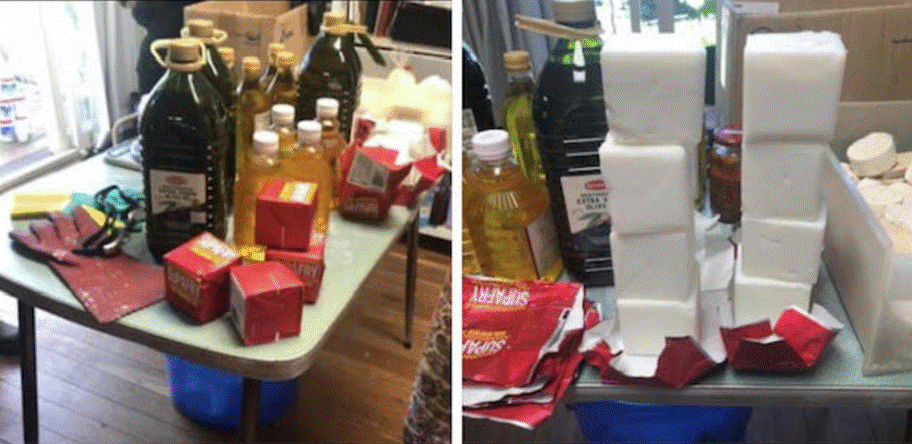
Eight enthusiastic participants all convened at Linda’s wonderful home in Coffs Harbour.
We made soap according to the recipe in the link at the end of this article, which makes 1 batch. We multiplied it to increase quantities.
- 1000g (1kg) coconut oil / copha – for good bubbles
- 2 litres olive oil – for hardness
- 500 ml macadamia oil (for palmitoleic acid which is beautiful on your skin). Whale ambergris was used centuries ago.
- 500g solid oil (super fry) – for setting
- 687g caustic soda
The first step was to add caustic acid to 1.83 litres of cold water. This chemical reaction creates lots of heat and therefore it needs time to cool down before the second step. To avoid injury, it is important that rubber gloves and eye coverings for protection are worn.
All of the oils were mixed together in a separate bowl, after which the caustic solution was added.
Once the mixture is the consistency of custard, add aromatics like essential oils or petals and/or exfoliants like fresh coffee grounds, oats or luffa to the basic recipe.
These were my choices:
- Rosemary leaves and flowers (silicon mould): the purple flowers turned yellow
- Oats (silicon mould)
- Lemon myrtle leaves (chopped) +/- luffa
- Luffa, lemon myrtle essential oil & calendula
- Lemon myrtle leaves and orange blossom essential oil
You can use professional silicon soap moulds. I was lent some from my neighbour. I also used one litre milk cartons and plastic containers with the necks removed. I put a whole luffa that I grew last season in 2 of the moulds. You can also pour the soap mixture into a Pyrex dish (and cut it later) or second-hand paper coffee cups.
This was the fourth year that Linda has done this workshop, which is held 3 months before Christmas. This was the hottest day yet, and our soap cured much faster than we thought. It was really surprising how fast it was hardening. Once fully cured, it’s ready to use.
My spare room is now filled with the lovely aroma of lemon myrtle. I feel very fortunate to have had this opportunity and hopefully, now you can give soap making a go too!
For more info about Linda and a wide range of other recipes and opportunities, check out her website The Witches Kitchen and Making Soap in Time for Christmas.
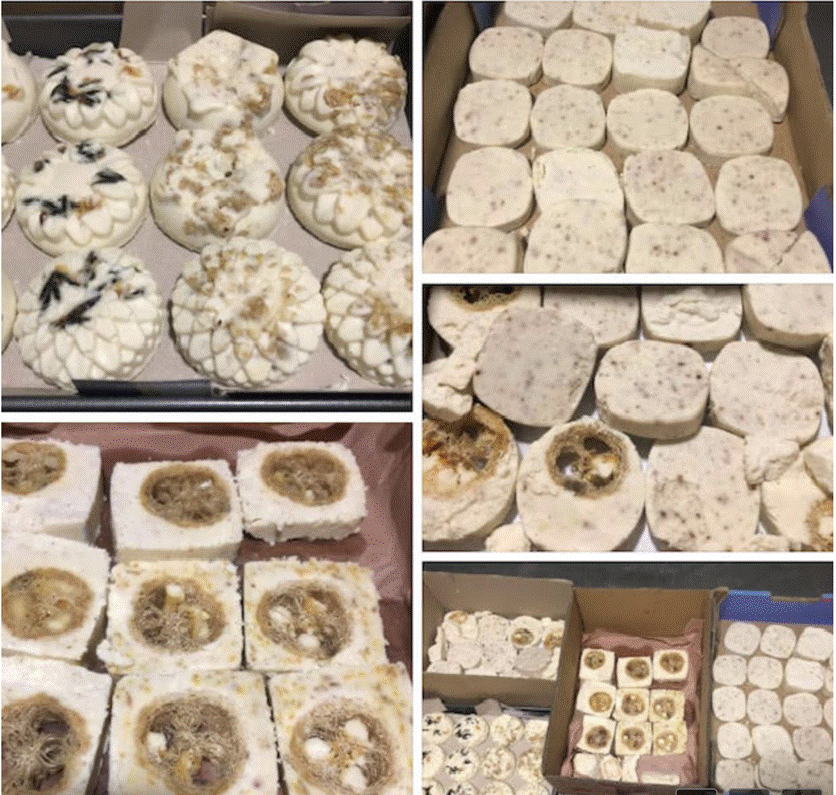
Being mindful in the face of climate grief, extreme weather and eco-anxiety
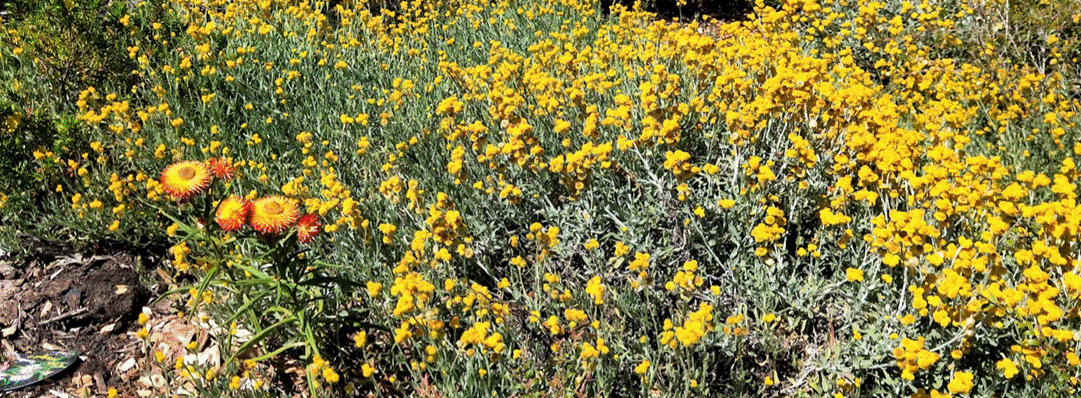
-Suzie Brown
With the climate crisis accelerating and more heatwaves, floods and bushfires happening across Australia and the world, many people are feeling fearful, angry and despairing. What kind of a future will our children – and ourselves – be facing? Floods, storms and bushfires have already directly affected many Australians, who have lost homes, livelihoods and even loved ones.
Feeling grief, anxiety and anger are natural and healthy emotional responses to such a large challenge. And the everyday stress of trying to recover from floods or bushfires is very real and ongoing.
We humans are part of the natural world and watching its destruction creates a deep grief and isolation within us all – even if we are not consciously aware of it.
Through understanding our emotions and stress responses, and by learning mindfulness practices, we can feel less stressed and more resilient. Letting our feelings flow, whilst also being grounded in the present moment, calms and energises us to rise to the challenges we face.
You don’t need to be burnt out by stress or have to numb yourself to cope. It’s possible to feel happy and even joyful amidst these growing crises. Emotional resilience can be learned. If you are curious, please check my workshop advertised under the ‘Events’ heading.
6 tips for Resilience: a community resource from Relationships Australia
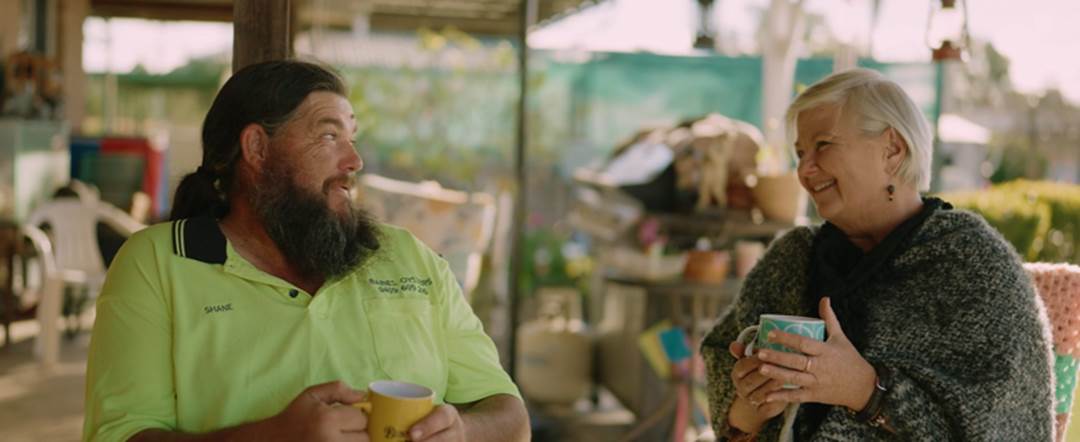
“In every community, the seeds of resilience exist. “-Relationships Australia
-Tanya Mottl
I recently spoke about managing stress for a video designed for Australian communities who are, or likely to be, impacted by extreme weather. 6 tips for Resilience introduces 6 people in disaster-impacted locations who each have something to teach us about becoming more resilient.
And I’d like to also share this very short (1.5 minutes) video, also from Relationships Australia, introducing the idea of Community Resilience Leaders.
More about Relationships Australia.
Swift Parrot is 2023 Bird of the Year
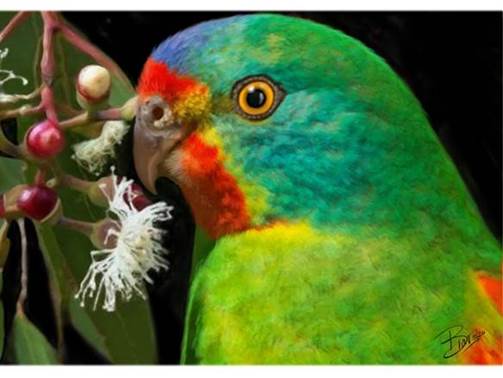
Threatened by extinction, the migratory Swift Parrot took out the crown for “2023 Bird of the Year” thanks to voters joining together to put a spotlight on its dire situation.
Over the last 2 years, Narara Ecovillage’s Flora and Fauna Conservation group has joined the conservation effort by planting 80 Swamp Mahoganys, a key Swift Parrot winter food source. The village is committed to maintaining the trees for at least 20 years, and hopes to host Swifties in the future. See this article from 2022 for a fuller report.
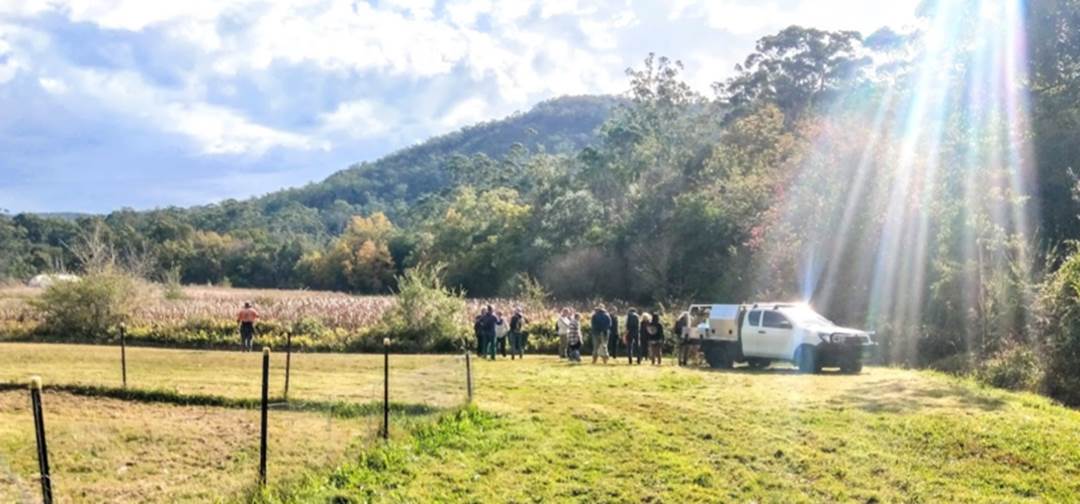
Village News
Hosting a Wilcannia Rugby League team for the Central Coast Koorie Games
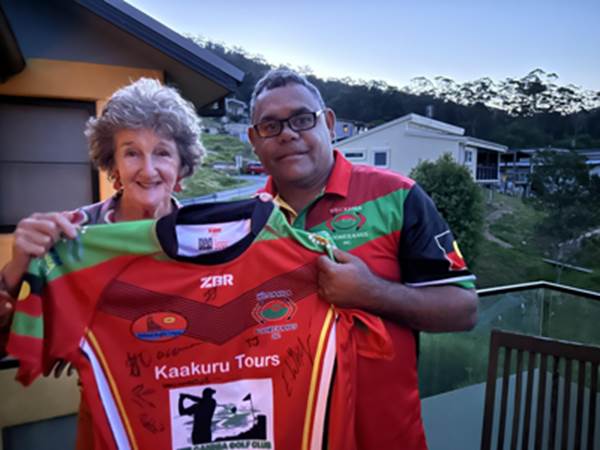
-Lyndall Parris
A very proud gubba was I to receive this team-signed Outback Rugby League jersey from the Wilcannia Boomerangs on behalf of all the Narara Ecovillage Community. Team coach Uncle Owen presented it to us on the final night of their 5-night camping stay with us.
Uncle Owen told us that they found it difficult to find accommodation on the Central Coast for his team to compete in the Central Coast Koorie Games. Kariong local Lisa Bellamy put out a request for accommodation for the Boomerangs and their supporters, and a member of the ecovillage immediately reached out.
Uncle Owen said the ‘boys’ have had a wonderful camp-over in our peaceful, natural setting and felt very welcome, especially on the first night, when the community mucked-in and provided a relaxed, reception dinner receiving each visitor at the door with a hand-shake, hello and warm smile.
This was a time when our community said a resounding YES to a request that will most certainly warm our hearts forever.
Events
Mon 16- Sun 22 Oct: Aussie Bird Count
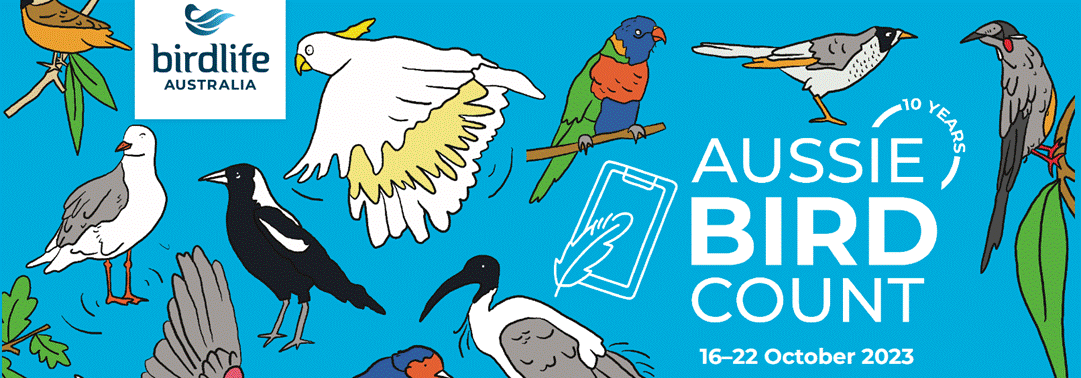
Join Australia’s largest annual citizen science event! No need to be an expert birder – this event is open for all ages.
- When: Pre-register now. Record your observations any time from Oct 16-22 (National Bird Week)
- Where: Wherever you are!
- Cost: Free
- More info & registration
Fri 20 Oct: Live at the Village – Loren Kate & Archer

Join us for an evening of folk and blues with two incredible musicians, Archer and Loren Kate, sharing their talent with us.
Be captivated by insightful and poetic lyrics, beautiful singing, stories, distilled spirituality and exquisitely shaped melodies
- When: Friday 20 October. Doors open 6.30pm, music from 7pm
- Where: Narara Ecovillage Hall, 33 Gugandi Rd Narara 2250
- Cost: $25 / $20 concession
- More info & tickets: https://events.humanitix.com/lorenkate-and-archer
Sat 21 Oct only: Narara Ecovillage is part of Central Coast Edible Garden Trail
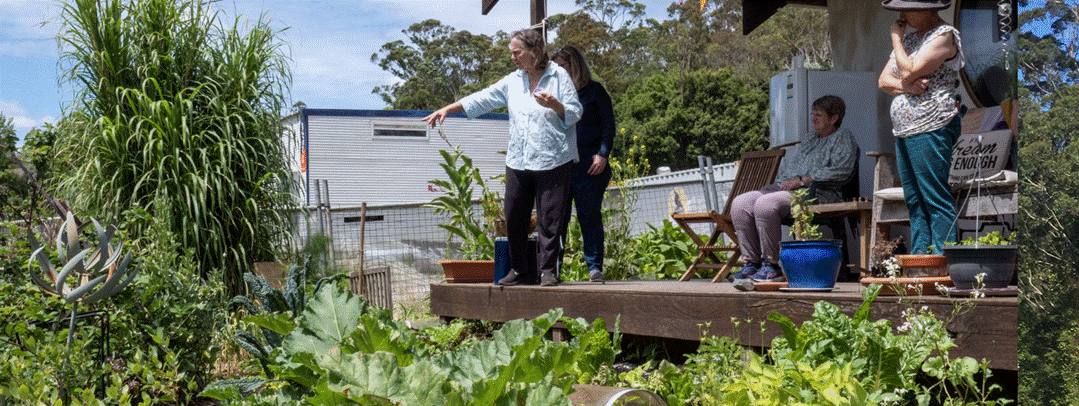
Follow the walking trail around the ecovillage to visit 7 stops showcasing a diversity of garden styles, and with garden hosts at each stop. Visit five home gardens, the community gardens in the Triplespan and glasshouse, and the Scribbly Gum Food Forest.
- When: Sat 21 Oct, 10:00am–3:00pm
- Where: Narara Ecovillage Hall, 33 Gugandi Rd Narara 2250
- Cost: $20-25 (this covers the full weekend trail- the ecovillage is just one part)
- More info about the NEV event & Registrationhere
- Buy tickets here (this covers the full weekend trail)
From Wed 25 Oct: Developing Emotional Resilience in Facing the Climate Crisis – 6 Session Course

Join mindfulness teacher Suzie Brown for a six-session online course to support you with the stress of eco-anxiety, climate grief and facing extreme weather events. All welcome.
This six-session course will give you a supportive space and targeted skills to develop resilience in handling the difficult emotions and stress that are natural responses to the destruction of our natural world.
You’ll learn the skills to:
- Calm your nervous system and be present and focused during stressful times
- Manage and be with your own emotions about climate and other life challenges
- Develop good feelings like gratitude, joy, happiness, contentment or calm
- Be able to handle challenges in life and the world.
Details
- When: Wed 25th October 7.30pm
- Where: online course
- Cost: sliding scale $150-350
- Register here: https://events.humanitix.com/emotional-resilience-in-facing-the-climate-crisis
Thu 26 Oct: Dealing with Stress After Extreme Weather Events – online course
– for Central Coast, New England & Hunter residents only
- When: 26th October 7.30pm
- Where: Online
- Cost: This course is free for residents of the Central Coast, Hunter & New England Regions – it is funded by Hunter New England and Central Coast Primary Health Network, & facilitated by Narara Ecovillage.
- Apply here: https://forms.gle/yBwGJpHA1UbdGFmVA
Sat 28 Oct: Narara Ecovillage Open Day
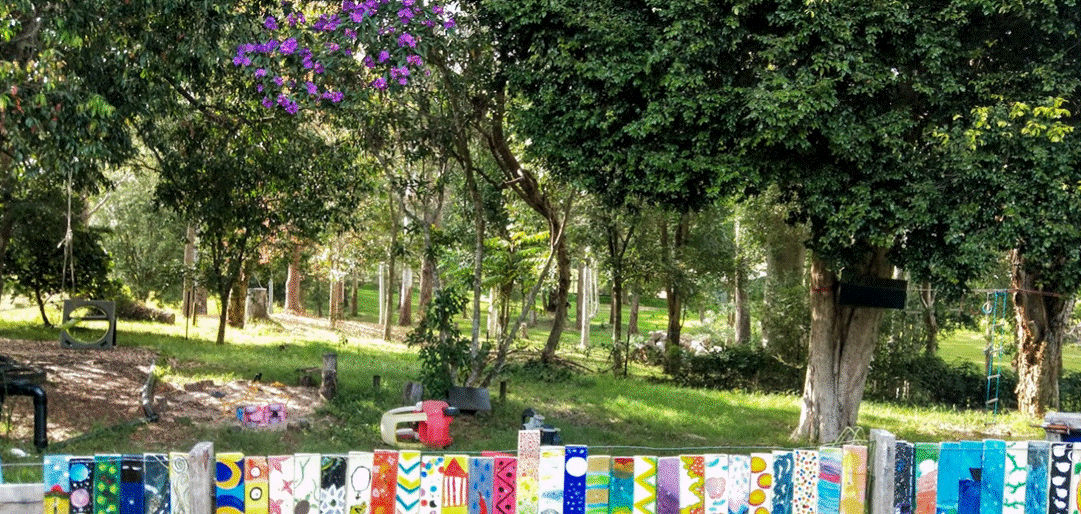
The Open Day talk and tour shows what Narara Ecovillage is all about, and demonstrates how we are activating a resilient community with ecological, social and economic potential by:shared food growing, natural retreats and Permaculture spaces; shared community and workplaces; examples of highly efficient low-carbon homes
- When: Sat 28 Oct, 10:30am–1:00pm
- Where: Narara Ecovillage Hall, 33 Gugandi Rd Narara 2250
- Cost: $15 per person – Kids & NELN members free!
- More info & Registration: Tickets here
If this will be your first visit to Narara Ecovillage, the Open Day Preview provides an introduction of the ecovillage and its unfolding story.
Fri 3 Nov: A Taste of Sociocracy with wine & cheese (& online)
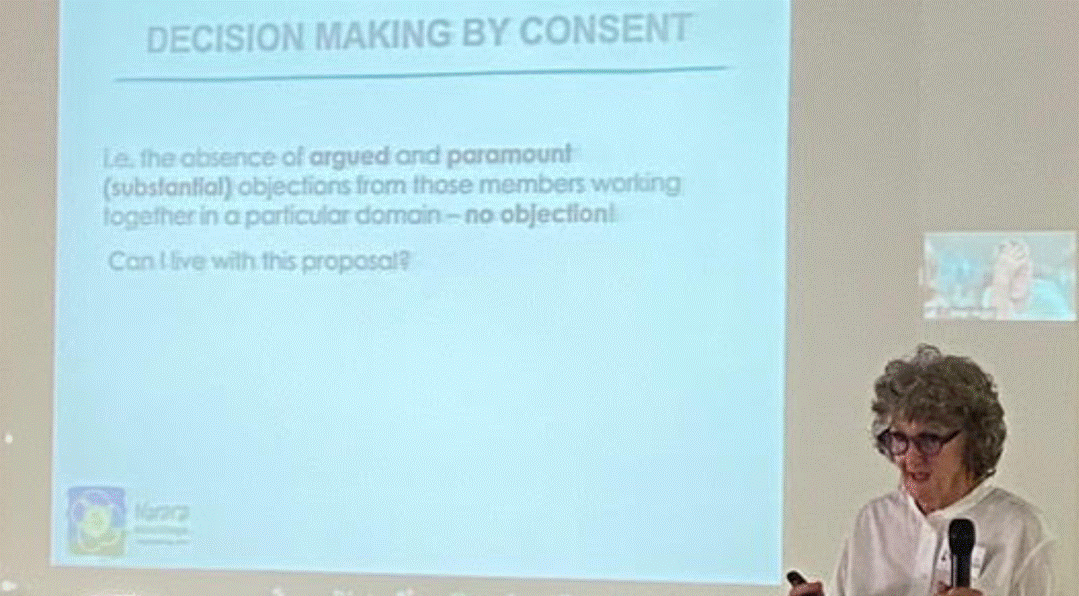
How do you get your family, business team or, in our case, 200 people to make decisions, resolve conflicts and feel that they have been heard?
Narara Ecovillage is using Sociocracy, a decision-making and governance system that:
- Is inclusive, transparent and equitable, including all voices
- Promotes a better use of resources, and coordination of activities
- Leads to care, respect and cooperation
- Ensures results of decisions are reviewed to determine their ongoing usefulness
Come and have a ‘Taste of Sociocracy’ in a presentation by ecovillage founder Lyndall Parris
- When: Friday 3 November, 5:00 in person/5.30 online –7:00 pm
- Where: Narara Ecovillage Hall, 33 Gugandi Rd Narara 2250
- Cost: $25 in person/ $15 online
- Registration & more info via our calendar here
Sat 4- Sun 5 Nov: Nonviolent Communication Foundation Training weekend workshop
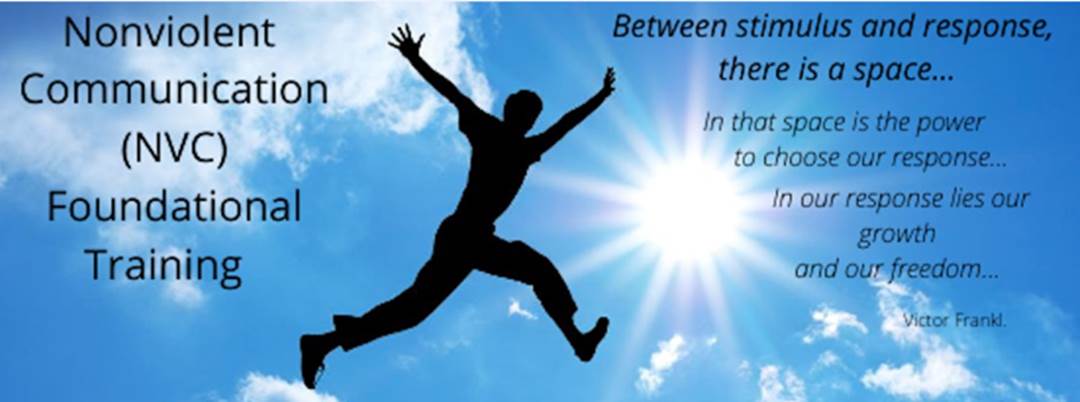
Social agility and interpersonal skills are arguably the most important things to learn for happy and healthy relationships. Yet it doesn’t necessarily come easy or naturally, because we have not been taught how to do it.
This Foundational course covers all the basic principles and practices of the Nonviolent Communication model (NVC) by Dr.Marshall Rosensberg.
The course combines theory, group discussion and exercises in a relaxed group setting.
- When: Sat 4 & Sun 5 Nov 9.30am-5pm
- Where: Narara (not the ecovillage)
- Cost: from $290
- More information & registration here
Wed 8 Nov: Wetland Restoration through Floating Landcare, Narara Creek
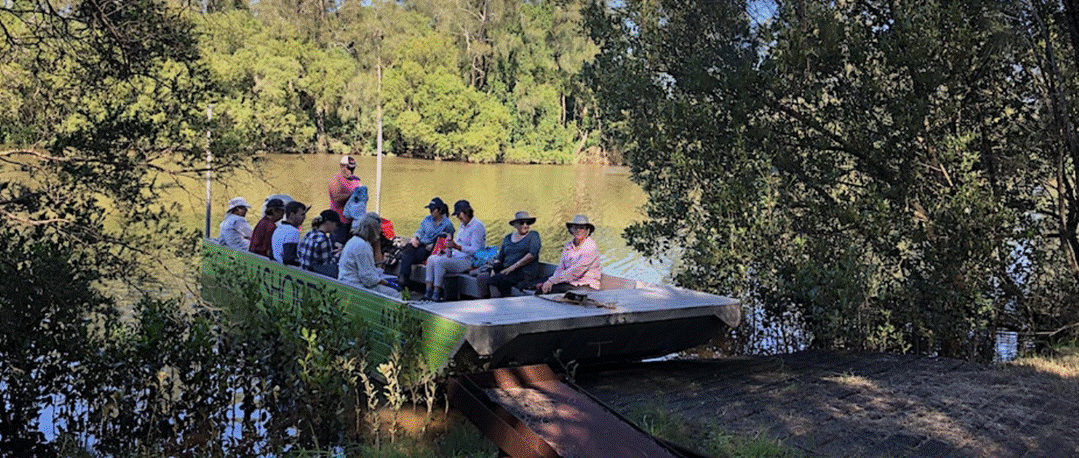
-A Central Coast Council event
We will focus on restoring the wetland through Floating Landcare techniques. You’ll have the opportunity to learn about the importance of wetlands, their role in supporting biodiversity, and the impact of human activities on these fragile ecosystems.
We will engage in various activities such as planting native vegetation, removing invasive species, and cleaning up litter to improve the health and resilience of the wetland.
No prior experience needed: our experts will provide guidance and all the necessary equipment.
- When: Wed 8 Nov 2023 8:15am-12:15pm (4 hours)
- Where: 15 Masons Parade Point Frederick, NSW 2250
- Cost: Free
- More info and registration
Fri 15-Sun 17 Dec: Deep Ecology Experiential weekend
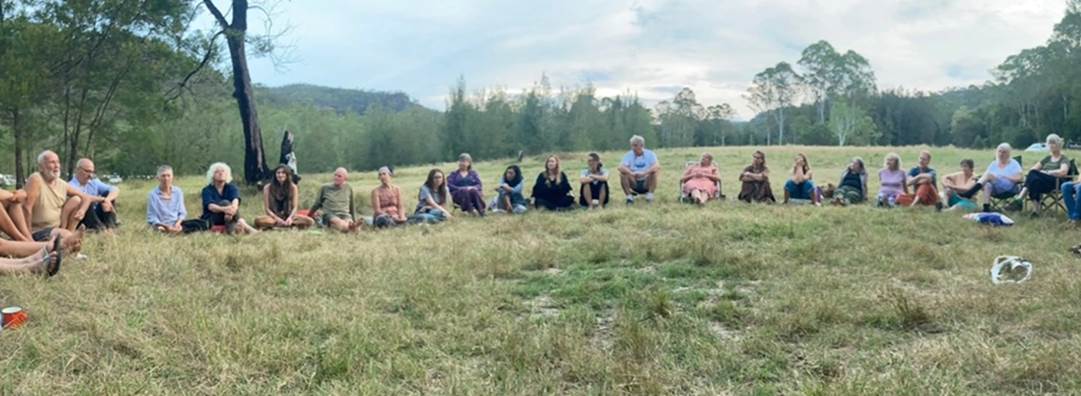
To deep ecology, underlying all the symptoms of the environmental crisis lies a psychological or spiritual root – the illusion of separation from the rest of the natural world.
- When: 4pm Fri 15- 4pm Sun 17 December
- Where: Narara Ecovillage, 33 Gugandi Rd Narara 2250
- Cost: Sliding scale from $150-$600, meals included, discounts available
- More info & Registration Here
Opportunities to join Narara Ecovillage
New opportunities to be part of this remarkable community
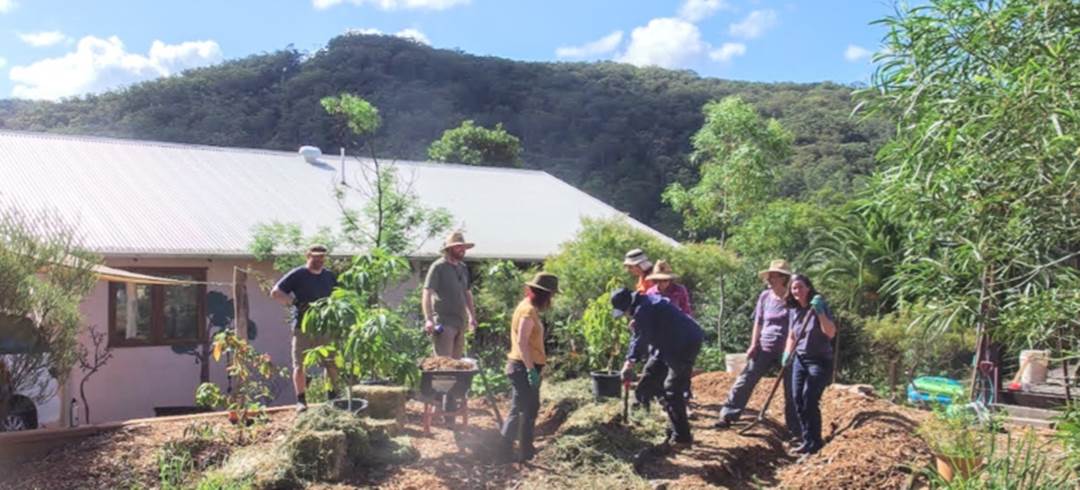
– Lyndall Parris
“We can tell people we’re selling community … and we’ll throw in some land.”
Instead of starting with the land and bank finance like most other housing estates, Narara Ecovillage started with people. We attracted future residents first, together sorted out a plan, found an extraordinary property, worked out alternative financing and established the ecovillage, building community at every step.
Now, imminent changes in government regulations will allow more diverse housing solutions, opening up possibilities that could include smaller lots, shop-top housing, and multi-dwelling & co-living units.
Once again, it is the interested people approaching us who will influence our further offerings
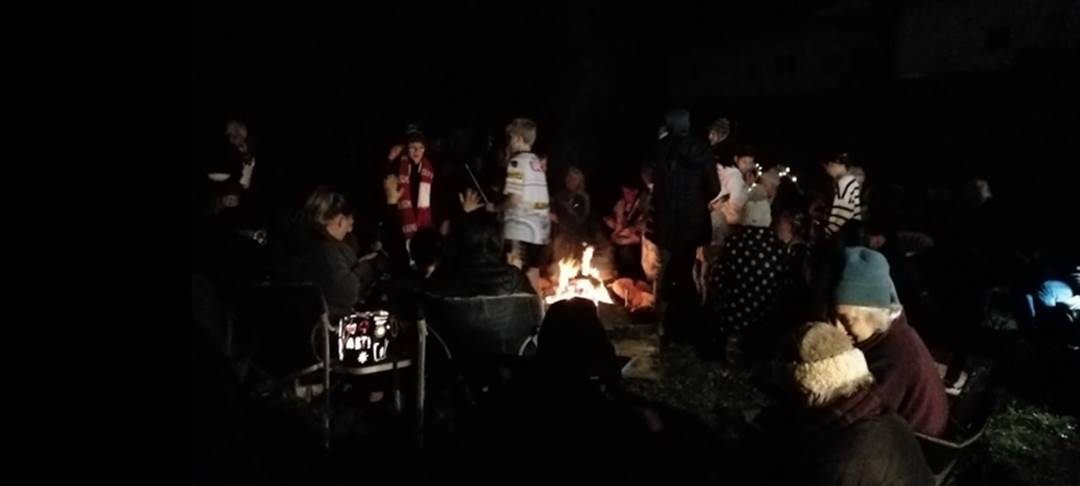
One of the remarkable aspects of the development of Narara Ecovillage is that, instead of starting with the land and a bank like most other housing estates, we started with people. Our early Project Director said – with a glint in his eye – we can tell people we’re, “selling community … and we’ll throw in some land later.”.
That is precisely what we have done. We attracted future residents first, together sorted out a plan, found an extraordinary property, worked out alternative financing and established homes in our ecovillage.
Now opportunities are arising with a new Local Environment Plan and Planning Proposal, which will enable us to open up more housing options. Once again, it is the interested people approaching us, who will influence our further offerings. People first!
There are 43 x 550sqm lot owners awaiting their imminent titles so that they can get on with building their homes in Stage 2 right now. In the ranks also are people interested in our new possibilities that could include 450sqm lots, smaller footprint multi-dwelling and co-living units, and a couple of shops/offices and shop-top housing. We will welcome a diversity of people passionate about living in this amazing intentional community.
Every day I witness the joy of bringing up children here. Dave and I have 2 of our 3 children and their partners living here with our two grand-sons aged 10 and 12 and a grand-daughter aged 5. We can view first-hand the wonderful childhood they are living amongst other village kids; riding around on their bikes, climbing the tree house, squeezing juice from our citrus trees, enjoying live music, learning how to raise seeds and grow fruit and veggies. It is the childhood I wish I had!
If you are yearning for a life like this, please join us on Saturday 28 October to attend our monthly Open Day event, contact our Admin Assistant: jazz.mozzi@nararaecovillage.com or contact me Lyndall@nararaecovillage.com to arrange for us to have a coffee together at our village Coffee Cart, operating Tuesday to Saturday.
We don’t know if it will be better when it’s different, but we know that it has to be different to be better.
In the meantime, never stop dreaming of a better life!
For sale in Narara Ecovillage: stunning natural-built 4-bedroom home and granny flat
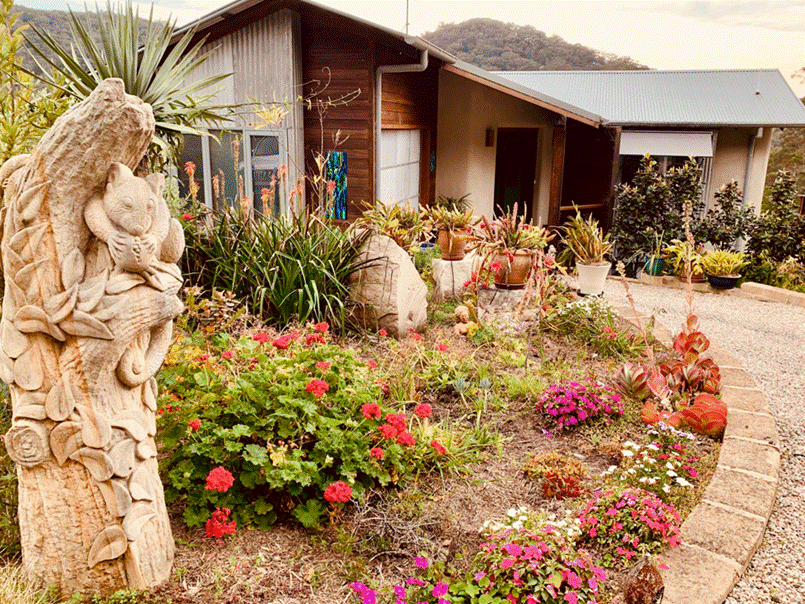
The owner is relocating to Queensland to be near family, so is offering for sale this unique 3-year-old architect-designed home, with 4 bedrooms, 2 ½ bathrooms and a separate one-bedroom granny flat.
Set in Narara Ecovillage, overlooking the valley below and tree-covered hills opposite, this two-storey eco-home includes an earthen floor, rammed earth feature wall, straw bale and straw panel walls, Marrakesh bathrooms, natural stone benchtops, traditional timber frames, double glazed windows and doors, curved external stairway – and so much more.
The home is jam-packed full of wonderful features, including an entertainers’ kitchen, open plan dining/living area and a media room (or a fourth bedroom). There is a powder room upstairs and internal access to the large single-car garage. Downstairs are three bedrooms, two with ensuites, and the master bedroom includes a walk-in robe. There is also a large laundry with lots of storage/linen space. The home includes underfloor heating and a whole-house water filtration system that supplies both the main home and the secondary dwelling.
Outside is a courtyard with a garden and water feature, and a patio with a surrounding raised vegetable garden.
The separate dwelling has its own entrance and a designated parking bay. It has the same quality appliances and finishes as the main home.
To buy in the Ecovillage one needs to be a member of the Co-operative.
- For more information and photos and to arrange a viewing, please email Sharyn at sharynwilson@me.com.
- To discuss price, contact Benn Wilson on 0404077014.
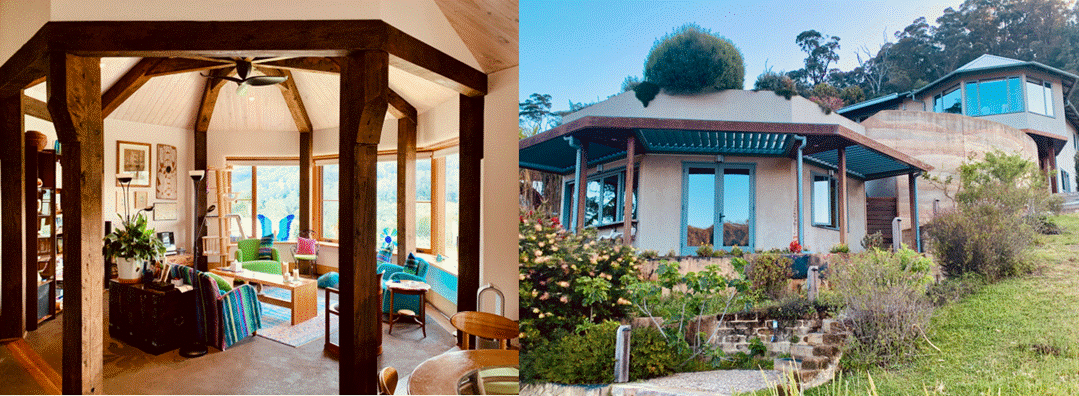
For Sale — Charming village home with space to expand
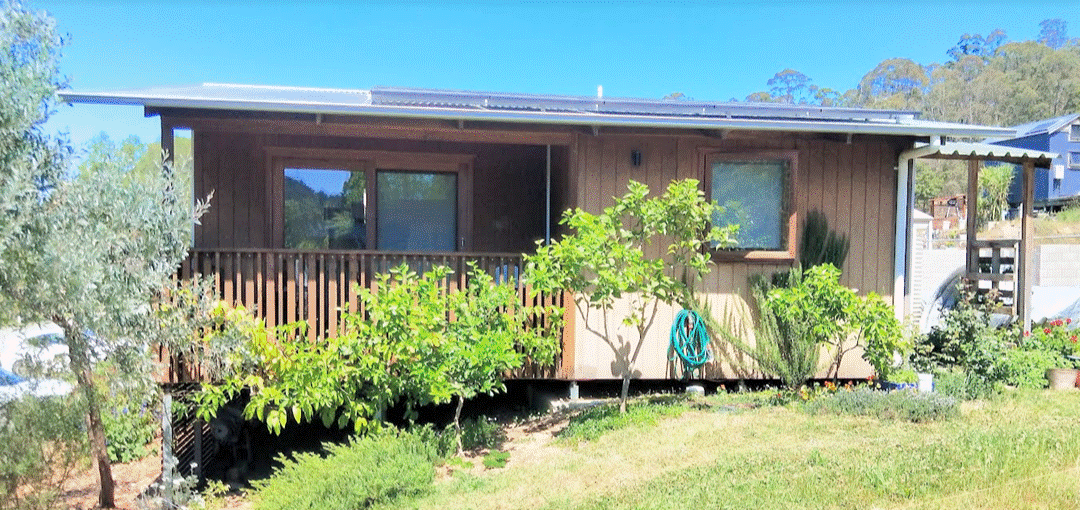
This 1-bedroom Viva Homes compressed-straw-panelled house is located in the heart of Narara Ecovillage!
Featuring a well-designed compact kitchen/living room with a separate bedroom adjoining a leafy, sunlit balcony, it is surrounded by a low-maintenance garden.
There is space to expand the house, and there is a separate A Class shipping container included on the block.
The village offers many social opportunities: concerts, yoga, community dinners, permaculture gardens, village food shop and much more. Enjoy walks to the 46 megalitre dam, nearby Strickland Forest, and many places of beauty.
Take this opportunity to join Narara Ecovillage and enjoy a great lifestyle with like-minded and friendly neighbours in a caring community.
- Contact Emily MacLaurin on 0410743314 or emilyemaclaurin@gamil.com to arrange a viewing.

Contact the Network News Editors neln.network.news@gmail.com
About the Network and the Village

The Network
The Narara Eco Living Network inc (NELN) is a not-for-profit incorporated association established on the NSW Central Coast to promote more sustainable living in all its forms.
We publish the Network News and run networking & educational events and community projects.
Become a supporter of the Network – 12 months membership is only $20 an individual or $40 a family. Networkers are offered discounts to a variety of events at the village, and free entrance to Open Days. Click here to check out upcoming events at the village. The network is 100% run by volunteers so we really appreciate your support!
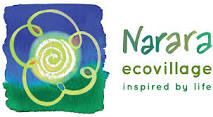
The Ecovillage
Narara Ecovillage is a community that blends the principles of ecological & social sustainability, good health, business, and caring. We are located on the NSW Central Coast at 33 Gugandi Road, Narara 2250. Click here for more info about Narara Ecovillage

